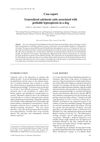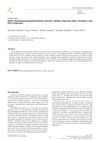 20 citations,
July 2013 in “International Journal of Dermatology”
20 citations,
July 2013 in “International Journal of Dermatology” Obesity increases the risk of skin infections, inflammatory conditions, and melanoma, but not basal cell carcinoma.
 13 citations,
November 2005 in “Veterinary Dermatology”
13 citations,
November 2005 in “Veterinary Dermatology” A dog's skin calcification condition resolved without treatment after a bacterial infection.
 8 citations,
October 2010 in “Scandinavian Journal of Clinical & Laboratory Investigation”
8 citations,
October 2010 in “Scandinavian Journal of Clinical & Laboratory Investigation” Normal-range ALT levels can indicate metabolic and hormonal imbalances in young women.
 7 citations,
December 2014 in “Australasian journal of dermatology”
7 citations,
December 2014 in “Australasian journal of dermatology” Insulin resistance is not more common in idiopathic hirsutism patients than in healthy individuals.
 24 citations,
October 1994 in “Fertility and Sterility”
24 citations,
October 1994 in “Fertility and Sterility” People with hair loss may have different levels of certain hormones due to changes in hormone processing.
 September 2024 in “Journal of Kermanshah University of Medical Sciences”
September 2024 in “Journal of Kermanshah University of Medical Sciences” Female-pattern baldness is not linked to more migraines.
 121 citations,
April 2008 in “European Journal of Obstetrics & Gynecology and Reproductive Biology”
121 citations,
April 2008 in “European Journal of Obstetrics & Gynecology and Reproductive Biology” Many women in southern China have polycystic ovary syndrome, with some symptoms differing from Western women.
405 citations,
January 2004 in “Journal of Investigative Dermatology” Hair follicle size and distribution vary significantly across different body sites.
 January 2011 in “Web journal anti-aging medicine/Anti-aging medicine”
January 2011 in “Web journal anti-aging medicine/Anti-aging medicine” KGS1 tablets improved skin and hair health.
 3 citations,
December 2016 in “PubMed”
3 citations,
December 2016 in “PubMed” Menstrual abnormalities in PCOS women may not greatly affect their metabolic and hormonal profile.
5 citations,
January 2021 in “PeerJ” Elephant tail-hair can show past stress levels, matching times when stressful events happened.
 July 2024 in “Clinical Case Reports”
July 2024 in “Clinical Case Reports” ANA-negative lupus nephritis can be diagnosed and treated effectively with a comprehensive approach.
 February 2024 in “Bangladesh pharmaceutical journal”
February 2024 in “Bangladesh pharmaceutical journal” The conclusion is that the tested yogurts from Bangladesh are rich in vitamins thiamine and riboflavin, and the testing method is reliable.
 8 citations,
June 2016 in “Journal of Cosmetic Dermatology”
8 citations,
June 2016 in “Journal of Cosmetic Dermatology” Women with persistent acne and high levels of antimullerian hormone are more likely to have polycystic ovarian syndrome.
 40 citations,
April 2008 in “European journal of endocrinology”
40 citations,
April 2008 in “European journal of endocrinology” Metformin and rosiglitazone both improved insulin use and hormonal symptoms in women with PCOS.
 July 2024 in “Periodontology 2000”
July 2024 in “Periodontology 2000” Autologous platelet concentrates show promise in esthetic treatments but need more standardized research.
17 citations,
January 2018 in “Journal of cutaneous and aesthetic surgery” The article discusses debates on hair transplant techniques, safe donor areas, PRP use, and practitioner qualifications in hair restoration.
 May 2023 in “Stem Cells International”
May 2023 in “Stem Cells International” Different parts of the body's fat tissue have unique cell types and characteristics, which could help treat chronic wounds.
 4 citations,
August 2016 in “Australasian Journal of Dermatology”
4 citations,
August 2016 in “Australasian Journal of Dermatology” Hair loss is linked to insulin resistance in women, regardless of hormone levels.

Cold-pressed rapeseed oil is most resistant to oxidation and certain oils may reduce chronic disease risk; consumers like the taste of pumpkin oil best.
 46 citations,
January 2020 in “Research”
46 citations,
January 2020 in “Research” Microneedle technology has advanced for painless drug delivery and sensitive detection but faces a gap between experimental use and clinical needs.
 April 2024 in “Animal models and experimental medicine”
April 2024 in “Animal models and experimental medicine” PRP treatment helps hair growth and rebalances scalp bacteria in androgenetic alopecia patients.
 146 citations,
December 2016 in “Translational Andrology and Urology”
146 citations,
December 2016 in “Translational Andrology and Urology” Hormone therapy is essential for transgender individuals but requires careful management due to possible metabolic effects.
 12 citations,
May 1995 in “Australasian Journal of Dermatology”
12 citations,
May 1995 in “Australasian Journal of Dermatology” Hair loss in women can be slowed with treatment, but more research needed for better solutions.
 26 citations,
May 2019 in “PLOS ONE”
26 citations,
May 2019 in “PLOS ONE” Hair loss patients have different microbes in hair follicles, possibly affecting hair loss.

research Acne
58 citations,
January 1997 in “Dermatologic Clinics” Acne significantly affects mental health and quality of life, with research suggesting hormonal and genetic factors in its development and emphasizing early treatment to prevent scarring.
 February 2012 in “InTech eBooks”
February 2012 in “InTech eBooks” PCOS increases the risk of heart disease and type 2 diabetes in women.

There's no clear link between female pattern hair loss, insulin resistance, and metabolic syndrome.
 January 2024 in “Diabetes & metabolism journal”
January 2024 in “Diabetes & metabolism journal” Disrupting natural body clocks increases the risk of developing type 2 diabetes.
 9 citations,
May 2005 in “Expert Review of Clinical Immunology”
9 citations,
May 2005 in “Expert Review of Clinical Immunology” Blocking interferon-gamma might help treat various autoimmune diseases.



























